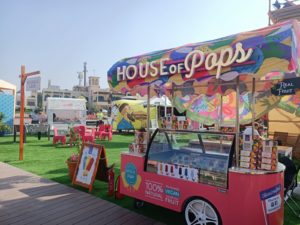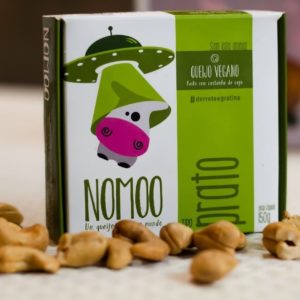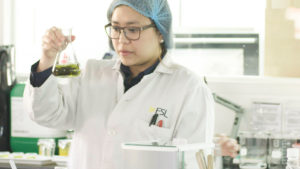Dubai – Vegans and consumers searching for healthier products could have much more options. Most food brands signal this trend at this year’s Gulfood. The term ‘plant-based’ is no longer an exception now; it is seen in many booths at the most notable food show in the Middle East, Gulfood.
Plant-based foods have been combined with other sustainability strategies. The entirely natural ice cream brand, House of Pops, is an example. Founded in the United Arab Emirates and using coconut milk in its formulations, the company delivers gluten-free or refined sugar-free vegan products with compostable packaging. “I came from Costa Rica, where popsicles are typical ice cream. And I thought of bringing something more refreshing here because everything I could find was heavy and creamy and, in the climate of Dubai, it makes sense to have healthier products with fruits,” revealed Marcela Sancho (pictured above), co-founder of the brand, in an interview with ANBA.

The company was founded in 2018 and today has over 17 points of sale. The brand already has a presence in Dubai schools. “We participated in an educational campaign to show children what sustainability is like and, at the same time, present a fruit-based product that is also healthy,” said Sancho. Among the assorted flavors of the brand, there is also space for Brazilian açaí, another highlight of Gulfood this year.
No cows
The healthy appeal of the Emirati brand’s products coincides with one of the pillars of a Brazilian company looking forward to expanding in Dubai. NoMoo has been producing vegan cheeses since 2015 and has non-vegans as 88% of its customers. “These are mostly people with lactose intolerance, and I received a lot of positive feedback on how the product helped to make these people’s experience more ‘inclusive,’” said CEO Marcelo Doin.

Doin, a founder of NoMoo, studied gastronomy in the United States. After hearing from a professor of the dairy subject it would be impossible to create a vegan cheese with the same characteristics of dairy, he decided to develop the product himself. “I learned molecular gastronomy, which became my passion. My wife, Nathalia Pires, is lactose intolerant, and I was vegan at the time. And we only found really bad vegan cheeses in New York. So, I said that it could not be impossible, with the proper techniques, to make a cool, roots, vegan cheese,” recalled the chef and entrepreneur.
Through his studies, the Brazilian developed processes with cashew nut milk. “Cashew nuts have sugars and carbohydrates, and with the process, I can break them down into small molecules that resemble lactose,” explained Doin. Thus, the couple developed 24 types of cheese and took the brand to Brazil. NoMoo is now planning to launch eight new products and hit shelves in the Middle East.
Landing in the Middle East
The company already exports to the United States and Latin America. To open the market in the Arab countries, the couple participated in Gulfood and got encouraged by what they saw. “We are in the process of obtaining halal certification, which is a priority in this environment. Dubai positively enchanted me,” said he, who is looking for distribution partnerships for the Arab and Asian markets.

In addition to the distribution of products made in Brazil, the entrepreneur plans to move forward, in a second moment, to produce in the Gulf. “It takes 30 to 40 days for the product to arrive in Dubai. If we do a nice ‘soft landing,’ maybe producing in an industry here, through private label, it could be interesting. Dubai has tariff agreements that can also facilitate exports to Asia and the European Union,” said Doin.
The businessman believes in the insertion of NoMoo in networks where he already has contacts, such as Carrefour; still, he also sees opportunities in smaller chains. “I also visited other supermarkets in Dubai, and I saw neighborhood grocery stores with vegan options, and it is a top-notch audience. It could be normal for neighborhood markets also to have sophisticated products,” he said.
Starting from the line he already works, the founder wants to open the market for mozzarella, curd, and cream cheese products. Yogurt will probably wait until the brand has established itself in the Arab nation. The company is still open to new investments. “We are starting our second round of funding for expansion, and we are very willing to do business with Arab and Asian funds,” concluded Doin.
Plant-based proteins

And for those looking to make their own plant-based meat, Food Specialties Limited (FSL), a food ingredients company, launched a ready-made beef replacement blend at Gulfood. Named Planta, the innovation is ready in five minutes using pea protein, vegetable fibers, and a mix of spices to make each flavor different.
In addition to being vegan, the food is also halal-certified. Planta Chicken and Planta Beef are aimed directly at the foodservice sector, such as distributors, restaurants, catering companies, and hotels. “We have several main types of products. Chicken meat is the most sold, while the beef used for kebab is the favorite of the Arab public,” explained Monu Chaurasiya, FSL’s Innovation Specialist.
The company has its own laboratories, where it develops ingredients to give different textures and flavors to products, especially those made from vegetables. Founded in Dubai in 1986, the company sells to vital buyer markets in other Arab countries, such as Egypt and Saudi Arabia.
Translated by Elúsio Brasileiro




